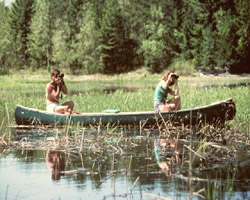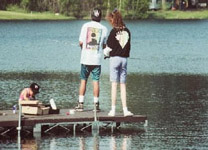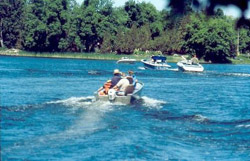Recreation & Boating

Boating is an integral part of our life by water. It allows us to take in the wonderful scenery that surrounds our waterfront property. But unless we are careful, the impact that boating can have on the water we rely so much on, may produce negative consequences. Fishing and swimming can become a lot less pleasant, and if we draw our water for drinking, it can pose serious health risks. Fuel spills, poorly maintained engines and old motors not only cost us a bundle, they can also be costly to fish and wildlife habitat. Of course, the least disruptive in terms of noise and water quality to use for boating are those that are non-motorized (like canoes, kayaks, row boats and sail boats). However, there are many things that those of us using motorized boats can do to ensure that the impact we have on the shoreline environment is a minimal one.
FAQs
1. What can I do to minimize the impact my motorized boat has on the environment?
Follow the “Green Boater Checklist”:
* Opt for the latest four-stroke or modern two-stroke injection motor.
* Keep up with regular engine maintenance.
* Inspect fuel line, clamps, and filters on a monthly basis.
* Drive at a “no wake” speed when approaching shore.
* Fuel up away from water if tank is detachable.
* Choose non-toxic cleaners.
* Clean your boat well (on shore) when leaving the water.
* Use the least toxic hull paint possible.
* Reduce grey water release – If you have a cabin on your boat, add a holding tank.
* Never discharge black water
* Use bilge pillows or absorbent pads to soak up oil, fuel, or anti-freeze, or install a bilge filter.
* Take your garbage home.
* Remove any plants or animals that may be clinging to the hull, trailer or motor, or that are hiding in the bilge


